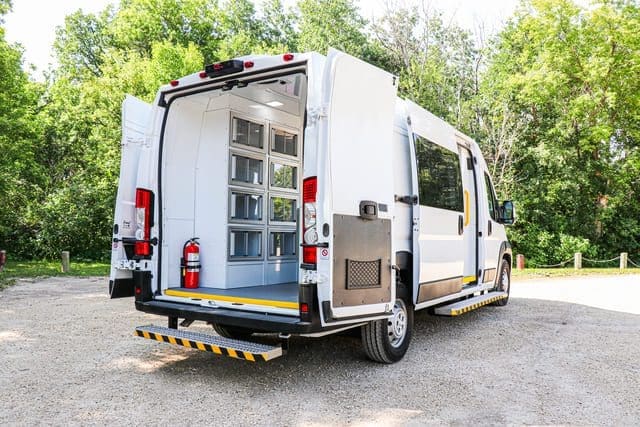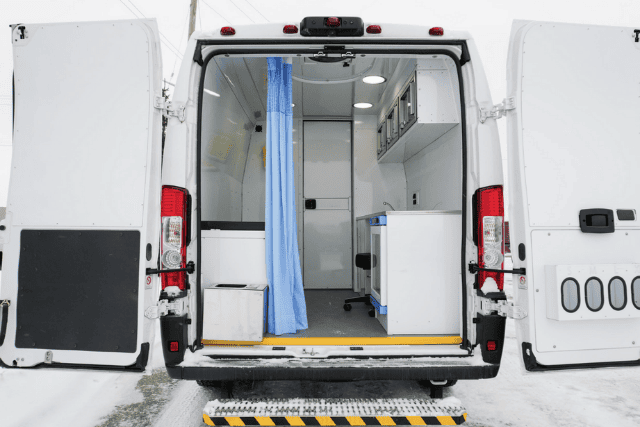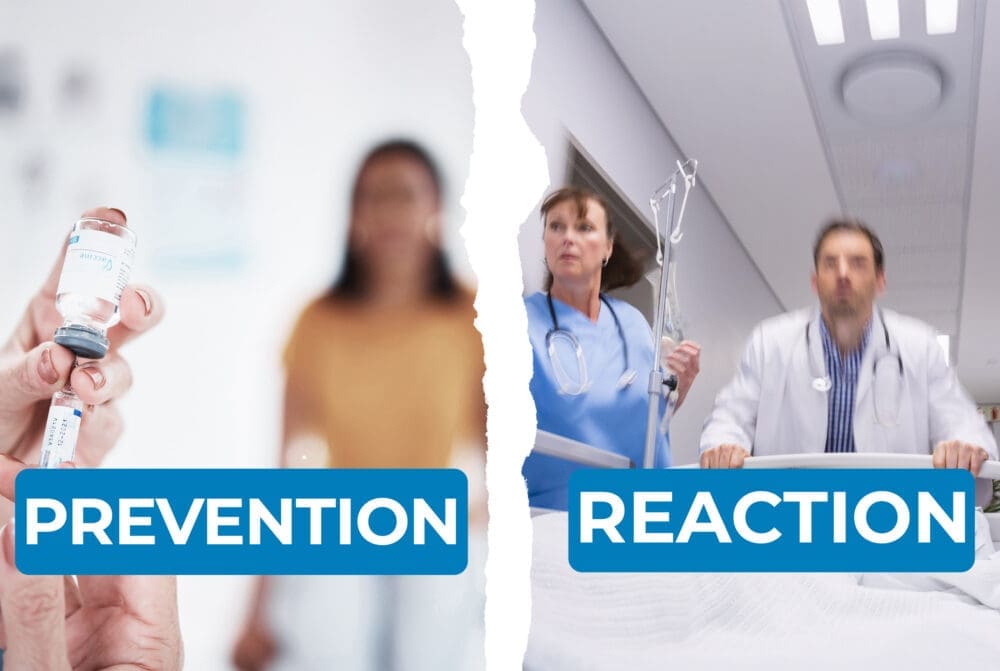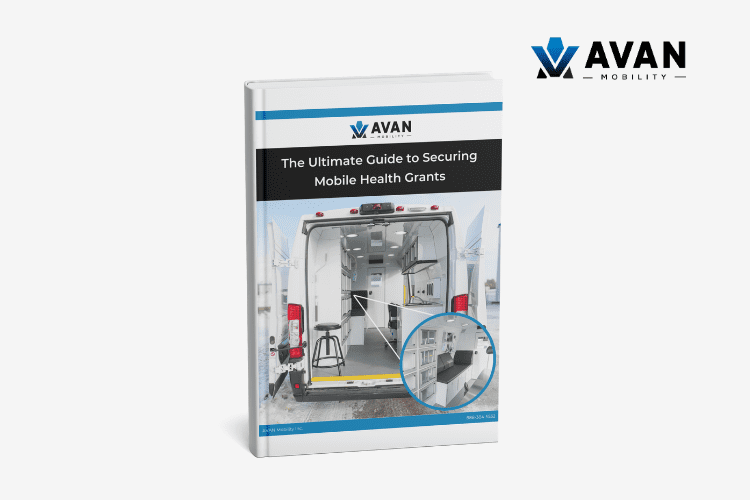Is your organization considering mobile clinic vans to try and address the issues you’re having with telehealth? Some of the hurdles that you can run into with telehealth are:
- Technology and internet access issues
- Lack of digital skills
- Privacy concerns about information being shared online
- No physical exams
At AVAN Mobility, we’re all about overcoming barriers to healthcare by manufacturing mobile clinic vans. We’ve been doing this for over 10 years now, and we work with clients like you to fully customize vans to fit your organization’s needs.
In this article, you will learn how mobile clinic vans can solve many of the challenges that your patients might face with telehealth.
You’ll learn:
- What telehealth is
- The challenges of telehealth
- The groups of people that might find telehealth difficult to use
- The benefits of mobile medical vans to address these concerns
What is telehealth?
Telehealth is a modern way to connect with healthcare professionals using technology like computers, tablets, or phones. Imagine talking to a doctor through a screen instead of going to the clinic. It’s like having a video call with a friend, but instead, it’s discussing health.
With telehealth, patients can tell the doctor how they’re feeling, ask questions, and even get medical advice. It’s a convenient option, especially for patients who can’t easily visit the doctor’s office. This can make healthcare more accessible and flexible for many.
Let’s take a closer look at some of the challenges your patients may face with telehealth.
What are the challenges of telehealth?
Using telehealth can present a range of difficulties for your patients. It’s important to understand and address these challenges to ensure everyone can access quality healthcare easily. Let’s take a closer look at the challenges.
For seniors
Some older folks might find telehealth a bit difficult because they didn’t grow up with lots of technology and the devices we have these days. They might need extra time to learn how to use the computer or tablet for medical appointments and might feel more comfortable with in-person visits.
For people without internet access
If someone doesn’t have the internet, it’s hard for them to do telehealth appointments. They can’t join video calls or use any of the online tools required to set them up. This means they miss out on talking to their doctor when they need to.
For people without digital skills
Using technology isn’t easy for everyone. People who don’t know how to send emails, use apps, or browse the internet might struggle with telehealth. They might feel frustrated or unsure about what to do during a virtual doctor visit.
In all these situations, it’s important to find solutions that make telehealth more accessible. Doctors, family members, and community organizations can play a big role in helping people overcome these challenges so that everyone can benefit from telehealth services.
One way to address all of the challenges of telehealth is by using mobile clinic vans.
What are mobile clinic vans?
Mobile clinic vans are like traveling mini healthcare centers. They have a space where doctors can examine you and talk about your health. Our mobile medical vans at AVAN Mobility have equipment for basic tests like checking blood pressure.
They’re especially helpful for people who can’t easily go to a regular doctor’s office, like those who live far away or have trouble moving around. Mobile clinic vans help make sure that everyone has a chance to see a doctor and stay healthy, no matter where they live.
For more information on mobile clinics, read our article on mobile clinic vans.
Who can use mobile clinic vans?
Many different groups make use of mobile medical vans. Let’s take a closer look at some of the common ones.
Native reservations
Imagine living in a remote place where going to the doctor’s office is like a journey to another town that’s hours away. That’s the case for many folks in Native communities. Sometimes, they’re just too far from a health center to get the care they need.
But here’s the good part – mobile clinic vans can roll in to help. These vans can come right to a Native reservation or an area close by. Plus, they’re not just about checkups. They’re there to chat about your patient’s feelings, answer questions about their body, and give advice that fits their culture.
Housing and homeless societies
If people don’t have a place to call home, life can be tough. Mobile medical vans are here to help make things a bit better. If your target patients are staying in a shelter or on the streets, they don’t have to go far for medical help. Inside the van, there’s a safe space just for talking and getting healthcare.
For behavioral health services
Sometimes, our minds need a bit of help too. But going to a regular clinic for it might feel strange because of the stigma that’s often attached to it. That’s where the mobile clinic vans shine. People can step inside and talk about their thoughts and feelings in a comfortable space. There’s no need to worry about anyone judging them. It’s a place just for them with a team that’s ready to help them feel better.
Take a look at our article on how a mobile clinic can help your behavioral health program.
For non-emergency medical transportation services
Have you ever needed a blood test or a check-up, but it wasn’t an emergency? That’s where the mobile clinic vans come in handy again. They’re like medical labs on wheels. If people need bloodwork, a physical check-up, first aid, or even a ride on a stretcher, these vans have their back. No need to rush to a faraway clinic – they’re here to take care of people, wherever they are.
Watch the video below to see a real example of an organization that purchased a van from us and is actively serving patients with it.
6 ways mobile clinic vans address telehealth challenges
There are several ways how mobile medical vans can address telehealth challenges.
Unhoused populations without access to technology
If your patients don’t have a home, let alone a computer or internet connection for telehealth appointments, they can’t get the healthcare help they need. That’s where mobile clinic vans enter the picture. Your organization’s mobile clinic van can easily park near a shelter or a street corner so your patients won’t ever have to worry about computers or a stable Wi-Fi connection.
People with a lack of digital skills
Have you ever felt lost trying to figure out new programs or technology? Well, you’re not alone. Many people find it difficult to use computers and apps on their phones for telehealth. With mobile clinic vans, your people don’t have to worry about setting anything up.
All they have to do is step into your mobile clinic van and your organization’s helpful staff will guide them through their visit.
Seniors who want simple solutions
Was there ever a time when you had to teach your grandparents how to use computers and apps? Telehealth might seem like a puzzle, but mobile clinic vans make everything much easier.
In mobile medical vans, seniors can effortlessly just chat with a doctor face-to-face without having to worry about clicking buttons or searching around the internet. Throughout a world full of technology hurdles, mobile clinic vans bring healthcare right to your patient’s doorsteps.
They’re not only healthcare clinics on wheels; they’re bridges that connect your patients to the care they need, no matter who they are or what they know about technology.
No travel expenses
Imagine living in an area that’s so remote that there’s no internet access to even consider telehealth appointments. If your patients have a chronic health condition, you can guarantee that their gas bills will be through the roof if the weather even permits them to drive to a healthcare facility.
Mobile clinic vans can save your patients from these expenses. It eliminates the need for them to travel hours away from their home and risk their safety.
Internet connectivity
Internet connectivity can be a huge issue in rural and remote communities. It can also become quite costly to afford. With mobile clinic vans, your patients never have to worry about being online. They don’t have to stress about a weak Wi-Fi signal or any frustrating data limits.
Mobile clinic vans bring healthcare to your patients without the need for internet connections or additional data charges.
Privacy concerns
Mobile clinic vans provide a private and secure space for medical consultations, ensuring that sensitive health information stays confidential. Unlike telehealth, where data travels through the internet, these vans offer a safe haven for patients to discuss their health without the worry of online information sharing.
With mobile clinic vans, personal privacy remains protected, making it a reliable choice for those concerned about their medical data being shared online.
What’s next?
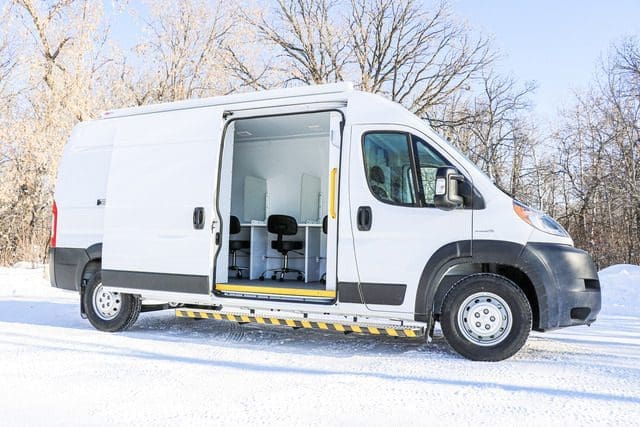
In this article, you learned about some of the different challenges surrounding telehealth.
You also learned how mobile clinic vans can enable your organization to address many of these challenges.
At AVAN Mobility, we’re all about overcoming challenges and providing innovative mobile clinic vans that are accessible to everyone. Everyone should have equal access to healthcare, and by investing in mobile clinic vans, your organization can help spread it to even the furthest corners of the country.
If you have any questions about mobile clinic vans, reach out to an expert.
Now that you know how mobile clinic vans can solve some of your telehealth challenges, you’ll be interested in knowing about some of the different types of mobile clinic vans there are. Read our article on 4 types of mobile medical units.
You might also be interested in some of the manufacturers of these types of vans:
